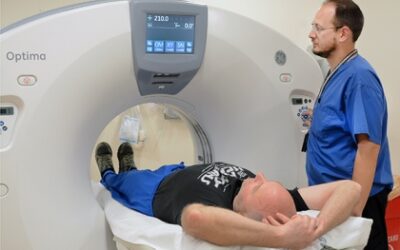Veterans who underwent VHA lung cancer screening were more likely to be diagnosed at an earlier stage and had higher cure rates than those who were not screened, according to a new observational study.
Prospective Memory Deficits Explained in Multiple Sclerosis Patients
Patients with multiple sclerosis (MS) have been found to have prospective memory (PM) deficits. A new study sought to better understand how and why that occurs.
Exposure to Agent Orange Associated With Increased Prostate Cancer Risk
In veterans who were on active duty during the Vietnam War era, exposure to Agent Orange was associated with a small increase in the risk of developing prostate cancer, but not metastatic prostate cancer or fatal prostate cancer, according to a recent study.
Veterans With MS Face Disparities in VA Smoking-Cessation Treatment
Even though smoking is a risk factor for multiple sclerosis (MS) development, symptom burden, decreased medication efficacy and increased disease-related mortality, veterans with the disease continue to smoke at critically high rates, according to a new study.
Why Does Epstein-Barr Lead to Multiple Sclerosis in Some Patients?
Only a small proportion of patients infected with the Epstein-Barr virus (EBV) develop multiple sclerosis (MS). A new military study sought to determine why that is and what the underlying mechanisms are.
In a Turnaround, Nearly All VA Hospitals Require Personnel to Get Flu Shots
In 2017, almost no healthcare personnel at VA hospitals reported in a survey that they had received mandatory influenza vaccinations. By 2021, almost all VA respondents said they had.
Processing of ICE Medical Claims by VA Sparks Controversy in Congress
The U.S. House of Representatives has approved an amendment to H.R. 8580, the Military Construction and Veterans Affairs, and Related Agencies Appropriations Act to prohibit the VA from processing claims for the Immigration and Customs Enforcement (ICE) Health Service Corps at the Department of Homeland Security.
Sacubitril/Valsartan Not Linked to Higher Dementia Rates in HF Patients
Could using the drug combination sacubitril/valsartan, an angiotensin receptor/neprilysin inhibitor, in heart failure patients increase their risk of cognitive impairment?
Influenza Associated With Coronary, Cerebrovascular Events in Older Veterans
Influenza is a significant contributor to coronary and cerebrovascular events in U.S. veterans and exacerbates underlying conditions, according to a new study.
Kidney Disease Defined by KDIGO Guidelines Riskier for Veterans With HF
Is chronic kidney disease (CKD) diagnosed based on a single estimated glomerular filtration rate measurement significantly different from that diagnosed using the Kidney Disease: Improving Global Outcomes (KDIGO) guideline?
Guideline Discordant Care Leads to Lower NSCLC Survival in AI/AN
American Indian/Alaska Native (AI/AN) patients have lower overall survival rates from non-small cell lung cancer (NSCLC), and at least part of the reason is that they are less likely to receive guideline-concordant care, according to a new study.
Mutant HRAS-Driven BC Tumors More Linked to Skeletal Muscle Dysfunction
The quality of life for many breast cancer patients is affected by skeletal muscle dysfunction, which is estimated to appear in about 39% of cases.
Red Flag Signs, Symptoms Could Mean Early-Onset Colorectal Cancer
Colorectal cancer is one of the most common cancers in the United States and worldwide, with about 4,000 cases diagnosed each year in the VA alone. While the rate of colorectal cancer among older individuals—who traditionally were at greatest risk—has decreased in recent years, the incidence in younger people has been increasing at an “alarming rate,” according to a recent study.
Using ‘Colon Age’ to Determine Cancer Screening for Veterans Younger Than 50
A new metric, so-called colon age, has been developed to help estimate the risk for early-onset colorectal cancer (EOCRC) in male veterans.
Sen. Elizabeth Warren’s Letter: Constituents Frustrated With VA Disability Exams
Veterans are reporting disability exam experiences with third-party contractors that are “inadequate and unprofessional,” and it has a leading Democratic senator asking what the VA plans to do about it.
Skin Disorders Such as Atopic Dermatitis Can Have Extracutaneous Effects
Aging can lead to the development of cutaneous symptoms and disorders, and in many older adults the effects often are not limited to the skin, according to a new VA study.
Psychiatric, Health Factors Should Be Considered in Veterans With Cognitive Decline
While cognitive decline in older people often raises suspicion of early Alzheimer’s disease, a new VA study underscores the importance of considering how factors beyond Alzheimer’s—including post-traumatic stress disorder (PTSD), pain and sleep difficulties—might also impact cognition in older veterans.
More Than 14 million U.S. Adults on Statins Might Not Really Need Them
Equations that estimate 10-year risk of atherosclerotic cardiovascular disease (ASCVD) appear to have overestimated the number of U.S. adults eligible for primary prevention statin therapy, according to a new study.
Smaller Brainstem Volumes Found in Gulf War, Iraq/Afghanistan Veterans
Gulf War and Iraq/Afghanistan veterans have significantly smaller brainstem volumes compared to healthy civilians, and damage to the brainstem structure of these veterans could potentially lead to sleep disturbances and chronic pain, according to a recent study.
Ilem Advocates for Disabled Veterans for a Quarter Century
There’s a well-worn quote about how laws are like sausages, in that you should never either being made. In reality, the legislative process can be even messier, more laborious, and require even more hands in its construction.
Bladder, Kidney Cancer Rates Lower in Younger Servicemembers vs. Civilians
Younger military servicemembers have lower rates of bladder and kidney cancer than a similar civilian cohort, but that appears to change with age.
Many Veterans With Diabetic Kidney Disease Might Remain Undiagnosed
The authors of a new study suggested their findings might warrant a revision of diabetic kidney disease (DKD) patient identification and management in U.S. veterans.
Higher MIBC Rate but No More Mortality in Black Veterans vs. Whites
Black patients presented with the highest rates of de novo muscle-invasive bladder cancer (MIBC) at the VA, a new study has found.
Military Veterans With Sex Chromosome Aneuploidies Tend to Be Underdiagnosed
Men with sex chromosome aneuploidies, meaning they have an additional X or Y chromosome, successfully serve in the U.S. military, but they have been greatly underdiagnosed and have higher medical morbidity with aging, according to a recent study.
Is Chlorthalidone Better for Veterans With Past Cardiovascular Events?
Prior myocardial infarction or stroke should be taken into account when deciding to prescribe chlorthalidone (CTD) vs hydrochlorothiazide (HCTZ) in older patients with hypertension.
Survey Suggests MTF Employees Remain Unhappy With DoD’s New Genesis EHR
A recent survey of employees at military treatment facilities shows significant dissatisfaction with DoD’s new electronic health record system (EHR), which completed its 7-year rollout in March.
Iron Deficiency Independently Association With Heart Failure Development
What is the relationship of iron status with incident heart failure in community-dwelling older adults, without regard to their kidney function?
Propofol Is Impairment Risk Factor in Children With ALL
New research evaluated the effect of cumulative exposure to anesthesia on neurocognitive outcomes among a multicenter cohort of children with acute lymphocytic leukemia (ALL).
Almost 1 in 11 U.S. Military Casualties Received Warm Fresh Whole Blood
To help save lives, especially in battlefield situations, the U.S. military has frequently used a so-called walking blood bank to obtain warm, fresh whole blood (WFWB).
VA Has Low Rates of Preoperative Life-Sustaining Treatment Documentation
Surgery is a significant healthcare event that necessitates timely planning for goals of care (GOC), involving discussions about one’s current values, aspirations and treatment preferences.



